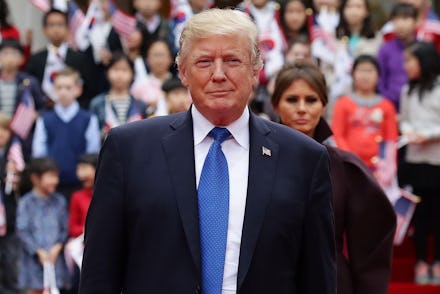One year since his election, Trump has normalized the abnormal in American politics

He had no political or military experience.
He’d risen to prominence as a bombastic businessman and reality television personality — and, later, as the face of the racist conspiracy theory that Barack Obama was not born in the United States.
He ran a chaotic campaign characterized by fiery nationalist rhetoric, vicious personal attacks and a relentless propensity to spread and repeat falsehoods, along with an ability to somehow weather political storms that seemingly would have brought down any other candidate.
Donald Trump was, in qualifications and demeanor, about as far from the norm as you could get.
But in early morning hours of Nov. 9, 2016, there he was — standing on stage at a Manhattan hotel, declaring victory in the presidential election.
“It’s been what they call a historic event,” Trump told a crowd of supporters after defeating Hillary Clinton to win the White House. “I can only say that while the campaign is over, our work on this movement is now really just beginning.”
To say that Trump and his administration have eroded political norms is an understatement. In the year since his election, the president has persistently normalized the abnormal in ways big and small, concrete and abstract, obvious and subtle — from “unpresidential” rhetoric to the undermining of federal agencies.
Things that once may have seemed unusual — the president of the United States using Twitter to attack political opponents and U.S. citizens, to taunt foreign adversaries and to announce policy, for instance — have now become routine.
The conflicts of interest that either disqualified others from office or that they were forced to address have, in Trump’s America, been allowed to fester. Government agencies are now run by officials with either little relevant experience or an open hostility to their missions. Even the nature of reality itself has been politicized as the administration casts its frequent falsehoods as “alternative facts.”
What does Trump’s new normal mean for America — and is it here to stay?
“We’re really in trouble as a country”
Amy Siskind, president and co-founder of the New Agenda, a nonprofit promoting gender equality, has been documenting Trump’s erosion of norms in close detail since his unlikely win.
For the past 51 weeks, she has chronicled everything that has been “subtly changing” in Trump’s America on the Weekly List — a rundown of news items showing the administration bucking the norms of U.S. democracy.
“We’re really in trouble as a country,” Siskind said in a phone interview.
To read through her dozens of lists is to be confronted with an administration dismantling the federal government, steadily chipping away at the rights of women and minorities and “bullying” those it considers enemies.
Some recent examples have included Trump’s emotional call for someone to “DO SOMETHING” about Clinton and the Democrats, reports of his apparent “joke” that Vice President Mike Pence “wants to hang” LGBT people and his feud with Sen. Bob Corker, who described the White House as an “adult day care center.”
“This is an assault on our democracy,” she said. “I think it’s had a very broad impact on our country. Our country has become meaner.”
Such actions “would not have flown in any other administration,” according to Heather Cox Richardson, a professor of American history at Boston College.
But, empowered by a Republican Party that has for years peddled an image of America as a place of “makers and takers,” Richardson said in a phone interview, Trump is now “dismantling” a system Americans took for granted — one that, according to Richardson, has been revealed to rely more on “norms rather than on laws.”
“So many of the things we thought in our system were established by law were really only established by norms,” Richardson told Mic. “Americans are realizing that things they took for granted are disappearing. They’re disappearing at a fast pace.”
“A long time to heal”
Still, Richardson said she expects the U.S. system to survive — even amid what she says are threats from Trump and his allies.
“Donald Trump is the most unpopular president in American history,” she told Mic. “I’m very heartened see the pushback.”
But, she said, Trump has wrought some damage that won’t be fixed easily.
“The damage to our international reputation will not be changed in our lifetime,” Richardson said.
Siskind is less optimistic.
The longer Trump remains in office, she said, the longer it will take to undo what he’s done.
“I think it’s going to take a long time for our country to heal and fix what happened,” Siskind said. “The divisions in our country, the us v.s. them stuff, is going to take decades to repair.”